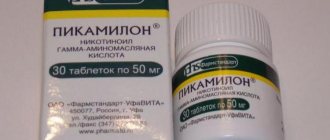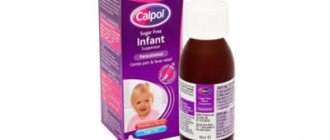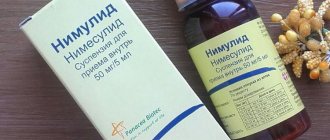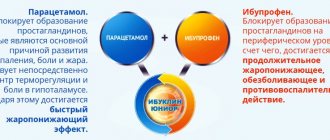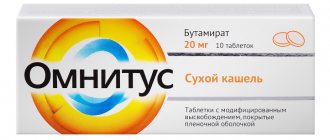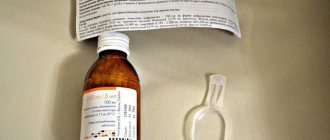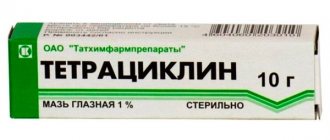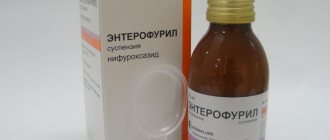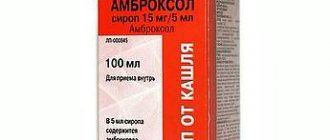Trade name of the drug: Amiksin®
International nonproprietary name: Tiloron
Chemical name: 2,7-bis-[2(diethylamino)-ethoxy]-fluoren-9-one dihydrochloride
Dosage form of the drug: film-coated tablets
Description Composition per tablet Pharmacological properties Indications for use Contraindications Use during pregnancy and breastfeeding Method of administration and dosage Side effects Overdose Interaction with other drugs Effect on the ability to drive vehicles and machinery Release form Expiration date Storage conditions Dispensing conditions from pharmacies Name and address of the manufacturer/organization receiving consumer complaints
Composition per tablet
Tiloron - 60 mg or 125 mg.
Excipients: core: potato starch - 25,500 mg or 46,000 mg, microcrystalline cellulose - 60,000 mg or 120,000 mg, povidone-K30 (kollidon 30) - 1,500 mg or 3,000 mg, calcium stearate - 1,500 mg or 3,000 mg, croscarmellose sodium ( primellose ) – 1,500 mg or 3,000 mg; shell: hypromellose (hydroxypropyl methylcellulose) – 3.4050 mg or 6.8100 mg, titanium dioxide – 1.7815 mg or 3.5630 mg, macrogol-4000 (polyethylene glycol-4000) – 0.4565 mg or 0.9130 mg, polysorbate -80 (Tween-80) – 0.0570 mg or 0.1140 mg, quinoline yellow dye (E 104) – 0.1235 mg or 0.2470 mg, sunset yellow dye (E 110) – 0.1765 mg or 0.3530 mg.
Pharmacotherapeutic group: antiviral immunostimulating agent – inducer of interferon formation.
ATX code: J05AX
Amiksin tablets for adults - instructions for use
Amiksin is produced in the form of tablets, which are coated with a film. They are orange in color inside and out, with minor white dots allowed. The active component of the drug, tilorone, is an antiviral immunostimulating agent that induces interferon. After taking the drug in the body:
- the production of four types of interferons is stimulated;
- bone marrow stem cells are activated;
- antibodies are intensively formed;
- the level of immunity increases;
- the ratio of different types of leukocytes is restored.
The drug suppresses the translation of specific viral proteins in affected cells. Thanks to this, the reproduction of pathogenic microorganisms is reduced. According to the instructions for use, Amiksin is prescribed for adult patients over 18 years of age for the treatment of:
- herpetic infections (herpes simplex virus, cytomegalovirus);
- ARVI and influenza;
- pulmonary tuberculosis in combination with other drugs;
- viral hepatitis types C, B, A;
- encephalomyelitis of viral or infectious-allergic etiology;
- as part of the complex treatment of chlamydia of the respiratory or urogenital location.
The bioavailability of the substance is sixty percent. Approximately 80% of the substance is combined with blood plasma proteins. Tilorone does not accumulate and practically does not change in the body. Absorption of the drug occurs in the intestines, then the substance reaches the liver, and then enters the blood. About 70% is excreted from the body in feces. The half-life process lasts 2 days, which causes Amiksin to be taken rarely.
Features of application
Amiksin combines well in adults with antibacterial drugs and medications to relieve symptoms. It is not recommended to use the product:
- with hypersensitivity to tilorone;
- during pregnancy (the drug has a toxic effect on the fetus);
- during lactation due to penetration into breast milk.
The drug does not have a sedative effect. Taking it does not affect the speed of reactions; the medicine can be used when performing work that requires quick reactions and when driving vehicles. Among the negative effects, the following manifestations are noted:
- stomach ache;
- itching, urticaria, swelling;
- temporary chills;
- nausea;
- vomit;
- diarrhea.
There were no cases of tilorone overdose. You do not need a prescription to buy medicine at a pharmacy. Consultation with a physician is recommended before use.
Pharmacological properties
Pharmacodynamics. A low-molecular-weight synthetic interferon inducer that stimulates the formation of all types of interferons in the body (alpha, beta, gamma and lambda). The main producers of interferon in response to the administration of tilorone are intestinal epithelial cells, hepatocytes, T-lymphocytes, neutrophils and granulocytes. After taking the drug orally, the maximum production of interferon is determined in the sequence intestines - liver - blood after 4-24 hours. Amiksin® has an immunomodulatory and antiviral effect. In human leukocytes it induces the synthesis of interferon. It also stimulates bone marrow stem cells, depending on the dose, enhances antibody formation, reduces the degree of immunosuppression, and restores the ratio of T-suppressors and T-helpers. The drug is effective against various viral infections, including influenza viruses, other acute respiratory viral infections, hepatitis viruses and herpes viruses. The mechanism of antiviral action is associated with inhibition of the translation of virus-specific proteins in infected cells, as a result of which viral reproduction is suppressed.
Pharmacokinetics. After oral administration, Amiksin® is rapidly absorbed from the gastrointestinal tract. Bioavailability – 60%. About 80% of the drug binds to plasma proteins. The drug is excreted almost unchanged through the intestines (70%) and through the kidneys (9%). Half-life (T1/2) – 48 hours. The drug does not undergo biotransformation and does not accumulate in the body.
special instructions
Amiksin can be purchased at a pharmacy without a doctor's prescription. Should be stored at temperatures up to 25 degrees away from children. Avoid exposure to light.
Shelf life – 36 months.
Many people are interested in the question of whether Amiksin is an antibiotic. The medicine does not belong to the group of antibiotics, but is an immunomodulatory drug.
Before taking the medicine, you should consider its compatibility with alcohol. The drug should not be taken in parallel with alcohol, since the latter reduces the effect of the active substances, which is why the desired result will not be achieved.
Does not affect the ability to drive vehicles and other dangerous machinery.
The drug can be used in parallel with antimicrobial agents and antibiotics.
Directions for use and doses
Amiksin® is taken orally after meals.
For children from 7 to 18 years: For uncomplicated forms of influenza and other acute respiratory viral infections - 60 mg 1 time per day on the 1st, 2nd and 4th day from the start of treatment. The course dose is 180 mg (3 tablets).
For adults (over 18 years old). For the treatment of influenza and other acute respiratory viral infections - 125 mg per day for the first 2 days of treatment, then 125 mg after 48 hours. The course dose of Amiksin® is 750 mg (6 tablets).
For the prevention of influenza and other acute respiratory viral infections - 125 mg once a week for 6 weeks. Per course - 750 mg (6 tablets).
For the treatment of herpes, cytomegalovirus infections - the first two days, 125 mg, then after 48 hours, 125 mg. Course dose – 1.25–2.5 g (10–20 tablets).
When treating influenza and other acute respiratory viral infections, if symptoms of the disease persist for more than 4 days, you should consult a doctor
Analogs
Good analogues of Amiksin are:
Lavomax is a drug that has antiviral and immunomodulatory effects. Prescribed for various forms of hepatitis, herpes, pulmonary tuberculosis, ARVI, influenza, chlamydia. Prescribed for complex therapy. Contraindicated in pregnant women, during lactation, and persons under 18 years of age.
Tiloram is a drug that has an antiviral effect. Taken for hepatitis A, B, C, influenza, ARVI. Contraindicated for pregnant women and children under 18 years of age.
Tiloron is an antiviral drug that has a stimulating effect on the human immune system. Effective in the treatment and prevention of influenza and acute respiratory viral diseases. Also helps with tuberculosis, hepatitis and multiple sclerosis. Do not take during pregnancy, breastfeeding or children under 7 years of age.
For hepatitis C
Therapy for hepatitis C is carried out according to the same scheme as the treatment of type B disease. The only difference is the number of tablets used, which reaches 20 pieces.
In this case, the drug is always used in combination with other medications that are aimed at improving the condition of the liver and preventing the progression of the condition. In case of a chronic course of the disease, courses can be long and last several months.
Contraindications and side effects
The medication is contraindicated in pregnant and lactating women, as it can cause complications.
There are other restrictions for use:
- The patient has a history of intolerance to the components of the composition or a tendency to such manifestations.
- Age up to 7 years. There is no data on the effect of the product on the body of a child under 7 years of age.
- Acute severe kidney pathologies accompanied by organ failure. In this case, the process of processing and removing the ingredients of the composition is significantly disrupted, which can negatively affect the patient’s condition.
- Internal bleeding due to damage to the mucous membrane of the digestive tract. With such a violation, the risk of not only damage to the mucous membrane increases, but also perforation of the organ wall, which can lead to the development of peritonitis.
- Acute neurological diseases, accompanied by severe disorders, pain and worsening of the condition.
- Blood pathologies accompanied by impaired production of the most important cells. At the same time, patients usually have other disorders, and treatment can provoke complications.
- Oncological pathologies at an advanced stage, in which the patient takes medications to suppress the immune system.
Contraindications include mental disorders, external bleeding of various origins, acute conditions due to cerebrovascular accident.
Amiksin for children (reviews about the drug are mostly positive) is used more often than other drugs, since it is considered safer and more potent. But pills can also cause complications. In most cases, they occur when instructions are violated or there are contraindications that were not taken into account during the examination.
| Organs and systems | Common Complications |
| Digestive tract | During therapy, dyspeptic disorders most often develop; they manifest themselves in the form of nausea and vomiting, loss of appetite and stool disorders. The patient's condition worsens if appropriate measures are not taken within several days. Sometimes complications are accompanied by pain in the stomach and intestines, severe flatulence. |
| Nervous system | During treatment, adults and children may experience headache, weakness and other manifestations. As the condition progresses, sleep disturbance, dizziness and temporary blurred vision occur. Adults usually talk about fatigue; in children, complications can manifest themselves in the form of increased excitability. |
| Musculoskeletal system | Muscle and joint disorders manifest as pain, especially during physical activity. Some talk about discomfort throughout the body, even without exertion. Usually the manifestations disappear after discontinuation of therapy; for many they persist for 3-5 days. |
| Skin | An allergic reaction to a drug is considered the most common complication. In this case, the patient develops a small red rash on the body, it spreads over large areas, leads to the appearance of a rash and burning of the skin, and can provoke irritation. When scratching, the patient damages the surface layer of the skin, which increases the risk of complications. |
The severity of negative reactions depends on the dosage of the drug, duration of use and individual characteristics of the body.
Amiksin - history of the drug and clinical studies
The active substance Amiksin tiloron has been known in medicine since the late sixties. Scientists carried out his research in the 70-80s of the last century in the USA. The following data was obtained:
- The presence of both lipophilic and cationic groups in the structure of tilorone was revealed.
- Tilorone provokes the accumulation of glycosaminoglycans in cells, which leads to mucopolysaccharidosis.
- In experimental animals, accumulation of adipose tissue in the retina and liver with its subsequent degeneration (phospholipidosis) was noted.
- 21% of patients taking tilorone developed retinopathy and keratopathy.
As a result, Western scientists recognized the toxicity of the drug and its research stopped. In medical practice, tilorone is prescribed only in the CIS countries. The substance was studied only in laboratory conditions. The effectiveness of the drug remains in question, since experimental animals received doses significantly higher than therapeutic ones.
The consequences of the use of immunomodulators for the human body are still unknown. The history of immunology goes back just over 30 years and there are still many dark spots in it. It is unclear what stimulating cells with interferon to divide can lead to.
Release form
Amiksin is a cellulose-coated tablet for oral administration.
They have a reddish color, round shape, convex edges. The manufacturer allows some whitish inclusions on the break of the tablet.
The drug has two standard dosages:
- 60 mg (children)
- 125 mg (for adults).
For adults, the drug is sold without a prescription; for children, a prescription from a specialist is required.
The product can be packaged in packages of 6, 10 or 20 tablets. There are two types of packaging: contour cells or polymer cans.
Interaction
Amiksin is well compatible with other antiviral and antibacterial agents, and can be used in conjunction with drugs for symptomatic treatment, including antipyretics, local vasoconstrictors, anti-inflammatory drugs, antihistamines, etc.
Since the active substance of the drug is metabolized in hepatocytes - liver cells, combined use with alcohol can have a negative effect on the functional state and organic structure of the liver.
With a reasonable choice of dosage of Amiksin and accompanying symptomatic medications, rapid recovery and complete restoration of body functions after viral diseases are observed.
Expert
Kravchenko Anna
Otorhinolaryngologist
5 years
Overdose
There is no data on an overdose of the drug, but doctors do not exclude this possibility when using tablets for a long period in high doses. Overdose occurs especially often in patients who suffer from severe kidney pathologies, since the drug is not eliminated in full and can accumulate in the body.
An overdose is accompanied by severe disturbances and aggravation of all negative reactions. The condition worsens significantly, severe headache, dizziness and nausea are observed. Repeated vomiting during the day is aggravated by severe thirst and dry mucous membranes of the oral cavity.
The medicine may cause persistent constipation or loose stools. If symptoms persist for a long time, signs of dehydration or toxic substance poisoning appear as a result of the lack of normal cleansing of the large intestine.
If complications or signs of overdose occur, you should stop using the medicine. If they persist or worsen, you should visit a doctor. In a hospital setting, the patient receives care depending on the symptoms. The medication does not have a specific antidote.
